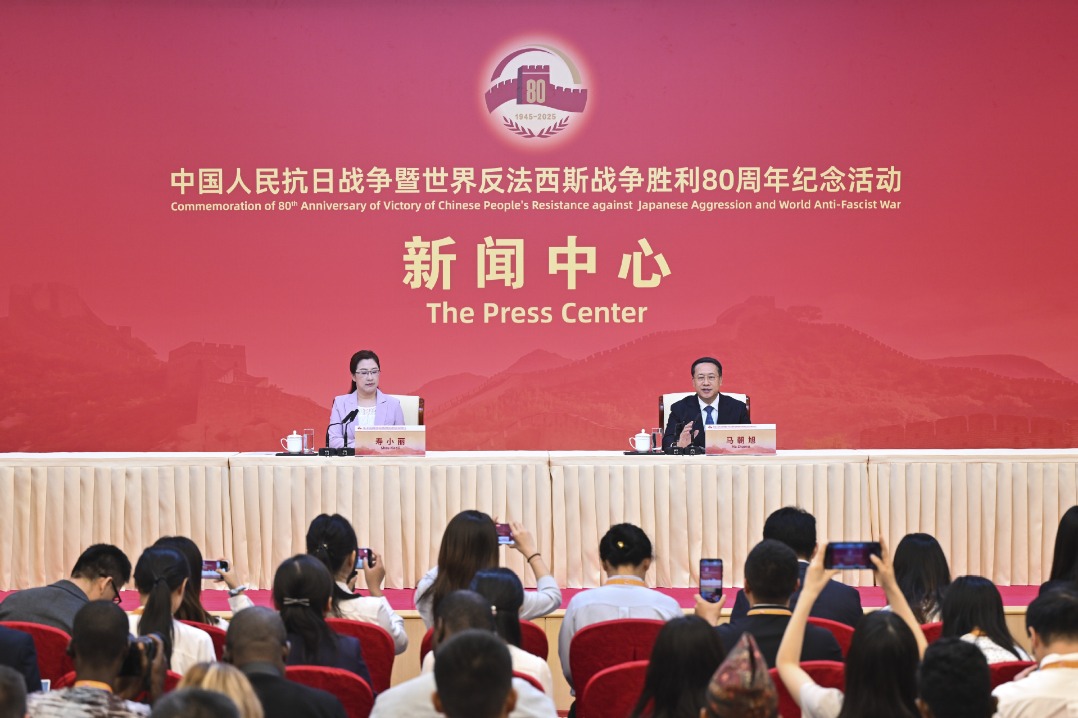Celebrating blue skies, and more


China's rapid environmental progress shows that its green transition ambition is genuine
As we are approaching a key moment for the Chinese government, I'd like to reflect on the remarkable environmental progress which I have witnessed in China in the past years. The skies are mostly blue again, the cities are becoming greener and more beautiful, and polluted water bodies have largely disappeared. Dolphins are returning to cities along the Yangtze River Delta, vast forests have replaced barren lands, key ecosystems are being protected, and wild giant pandas are growing in numbers.
When I started working in Beijing on environmental cooperation in 2007, all of this was unimaginable. My first daughter was also born that year. She was exposed to Beijing's heavy air pollution, and developed asthma. Although she has gradually improved, it is a reminder to me that environmental problems can have very real consequences for all of us, rich or poor, including those who barely contributed to the problems in the first place.
China's big turning point for the environment came in 2013, when the government started to publicly disclose air pollution data. The air quality was absolutely dreadful at that time, so sharing hourly air quality data from numerous monitoring stations was a bold step, and advanced by world standards. The air quality data went viral on social media, sparking a strong sense of public concern and triggering a landslide shift in environmental awareness around the country, at all levels.
A series of resolute actions followed, and this strong level of effort still continues today. A new Environmental Protection Law was adopted in 2014, and strictly implemented. But it was recognized that the government alone couldn't solve this problem. Environmental information disclosure and public participation were required in the new law, creating a more level playing field for businesses, and encouraging bottom-up actions by environmental NGOs, including public interest court cases against polluters. A whole raft of environmental laws were adopted or improved. Environmental courts and tribunals were established around the country, and public prosecutors were also given the right to bring court cases against local government departments that violated environmental laws. Public interest prosecutors initiated over 80,000 cases for the environment in 2020 alone.
All of these enforcement actions have led to a shift in mindset among business leaders and government officials. Environmental laws are like any other law — they serve to protect all of us, and must be properly implemented.
I've also witnessed huge improvements in public environmental awareness and behavior. People I speak to in China today generally care about the environment, and are thinking about how they can do better. People engage in cleanup actions, and want to see waste sorting systems function properly. China is by far the largest market for electric vehicles in the world, accounting for about half of the global market.
China's concern for the environment is of global significance. I believe that President Xi Jinping's announcements to achieve carbon neutrality before 2060 and to stop investing in coal power overseas were some of the best climate-related news since the Paris Agreement. China has already decoupled economic growth from emissions — carbon emissions intensity has decreased by 34.4 percent over the past 10 years, while its GDP has more than doubled. China is now a world leader in green finance, has planted more trees than any other country, and has led a highly successful crackdown on the illegal trade in wildlife. About one-third of China's territory will be conserved under the ecological conservation redlines policy.
Of course, much more needs to be done, and China is simultaneously addressing a vast range of environmental problems. Just to give a few examples, air pollution remains a huge problem, along with the overuse of fertilizer and pesticides, mounting municipal waste, especially from e-commerce, plastic and ocean pollution, harmful chemicals, ecological damage, biodiversity loss and much more.
In terms of climate action, although China's carbon emissions are estimated to have dropped by about 8 percent in the second quarter of 2022, this is probably temporary and we have yet to see a peaking trend. The power grid and market need to become much more flexible, to supply secure, low-carbon energy, making optimal use of the huge amounts of renewable energy capacity which are being deployed. As China moves away from its former, heavy industry-dominated economic structure, people in many regions and communities will need to find new livelihoods in the strategic sectors of the future.
Developing countries around the world need to be supported for the global green transition to work. More than one-tenth of the world's population still live in extreme poverty. China has committed to financing no more coal-fired power plants overseas, and to support other countries in deploying grid-scale renewable energy solutions. Europe and the United States have also announced similar green development initiatives. In the coming years I hope to see a friendly competition in this space, where development partners compete with each other who can offer the best green solutions.
In December this year, China will preside over a critical conference of the United Nations Convention on Biological Diversity, in which we hope to see a new global agreement to avert the catastrophic loss of nature. The abundance of many species and ecosystems, which have taken millions of years to develop, has declined by half in only the last 50 years, and this trend continues today. China is positioned as a mediator between developed and developing countries, seeking ambitious, realistic and balanced solutions. The result could be as significant as the Paris Agreement.
Environmental problems are mounting around the world, but we can't give up, we need to remain confident that we can find solutions. Seeing China's rapid progress over the past years has convinced me that it is possible for it to achieve the goal of becoming an ecological civilization. Europe also faces many challenges today, but it is doubling down on its green transition nonetheless, and we see important progress in other countries.
As long as we can continue to work together, the environmental challenges which lie ahead of us can be overcome.
The author is chief representative for China and regional director for Asia of ClientEarth. The author contributed this article to China Watch, a think tank powered by China Daily.
Contact the editor at editor@chinawatch.cn

































